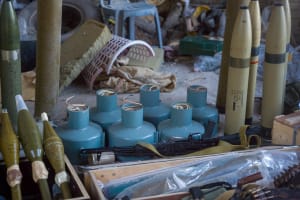In the shadow of war: Israel celebrates ‘Feast of Freedom’ while awaiting release of 133 hostages
Hostage families to hold holiday seder meal in Tel Aviv's Hostage Square

On the eve of Passover, commonly called the “Feast of Freedom” in Hebrew, many Israelis will have a difficult time celebrating while 133 hostages remain in captivity, and tens of thousands of Israelis are internal refugees in their own country.
“The timeless Passover refrain, ‘In every generation, a person must see themselves as though they went out from Egypt’ has taken on new meaning – ‘In every generation, a person must see themselves as though they are in Gaza’,” the Hostages and Missing Families Forum wrote last weekend.
Liat Bar-On lives in Kibbutz Be'eri, one of the places hit the hardest by the Hamas invasion and massacre on Oct. 7. “They burned houses that I was sitting in with friends, and murdered children who were friends of my sons,” she wrote in the Israeli newspaper Yedioth Ahronoth.
“Who would have believed that I would give everything so that this year a Passover Seder would be held in Be'eri, but it is impossible.”
“We will be with members of Kibbutz Be'eri in the Hostages Square… and we will pray together that the abductees will return, and we will pray together that the war will end and we will pray together that next year we will return to order in the kibbutz. We will pray that we will be who we are again,” Bar-On wrote.
Since Oct. 7, thousands of residents of the Israeli communities in the Gaza Envelope have been internally displaced, living in hotels and state-financed rental apartments.
Among these communities are the residents of Kibbutz Nir Yitzhak, who will spend the holiday in their temporary home in a hotel near the southern city of Eilat.
This year, the kibbutz community reformulated the traditional Passover liturgy to reflect the fact that 133 hostages are still being held captive. Instead of the traditional question, “What is different during this night,” the residents of Nir Yitzhak will ask: “What will change?”
Ofra Bacher, co-author of the renewed liturgy, explained to Ynet News that the traditional call to share the story of the Jewish people to their children is especially poignant this year.
“This year was different, the power relations were shaken and the feeling is as if the blows fell on us. We want to be free in our country and in our home,” Bacher said.
“This year we are not celebrating Passover, but we are marking the holiday, especially for the children of the kibbutz,” said Nati Lanternari, the cultural coordinator at Nir Yitzhak.
“The feelings are very difficult now that we have reached Passover and the hostages are still in Gaza, we are not at home and we do not know when we will return home.”
In addition to the Israeli towns and villages in the Gaza Envelope, dozens of communities on the northern border remain evacuated from their homes because of the continuing attacks by the Lebanese Hezbollah terror group.
About 90 members of Kibbutz Hanita, located right on the border with Lebanon, will spend the holiday in Kibbutz Ma’agan Michael, close to Caesarea.
Lila Kaminsky, who manages the Passover celebration for the kibbutz, told Ynet News that ”the decor of the dining room and the stage will be yellow – the color of the release of the hostages. In addition, we added a fifth [wine] cup to call for the release of the kidnapped - because the holiday is not complete without them.”
The community director on Kibbutz Eilon, Lilach Agra, said: ”I find myself doing crazy things to connect the members of the kibbutz and at the same time help the emergency squad that remains in the kibbutz.”
”The 1,200 members of the kibbutz are scattered all over the country – Sde Boker, Kedma, Beit Alfa, Haftziba – from Eilat to the Golan Heights.”
Lilach, along with her husband and three children left Eilon and rented an apartment in Nahariya.
”This year, we will hold the seder in our temporary home in Nahariya with my husband’s extended family who has also been evacuated from the kibbutz,” she said.
”Despite the short distance between the city and our kibbutz – the difference is profound. The special atmosphere that exists in the kibbutz, the sense of closeness and familiarity of everyone with each other, the view and the peace are missing.”
”To get to Eilon is to get to a place that is all nature and green around – but when you enter the gate of the kibbutz, you realize how desolate it is,” she continued.
”Until we return home and until the abductees return – it will be difficult to say 'Happy Holidays' this year.”
We recommend to read:

The All Israel News Staff is a team of journalists in Israel.














